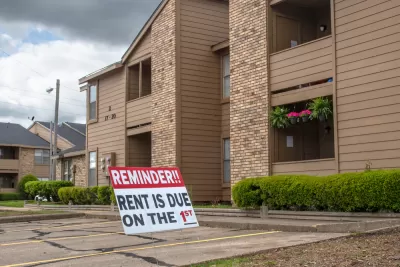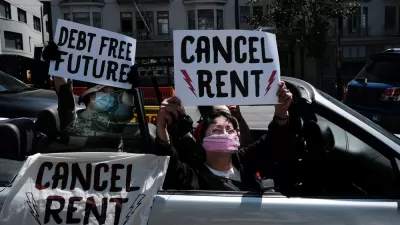The CDC's eviction moratorium will stay in place until at least June 30, 2021.

[Updated March 31, 2021] "The Centers for Disease Control and Prevention extended its federal moratorium on eviction for non-payment of rent until June 30," reports Anna Bahney.
"It marks the third time the deadline for lifting the ban has been pushed back. The CDC's order first went into effect in September and initially was set to expire at the end of 2020. But then in December, the protection was extended until January 31. As one of his first acts in office, President Joe Biden called on the CDC to extend the ban until March 31."
Bahney also notes that $50 billion in federal relief money has been approved for renters in the past two federal stimulus packages—the first while Donald Trump was still in office and the second the most recent American Rescue Plan Act.
Despite various eviction moratoria in place by the CDC and local and state governments around the country, many renters are still being evicted and renters are racking up debt that still threatens to destabilize the housing market and the larger economy. A Moody's Analytics report from January 2021 estimated that the nation's renters owed an estimated $57 billion in back rent.
The CDC has lost two recent court cases over the enforceability of the eviction moratorium, although both court decisions stopped short of repealing the moratorium. The U.S. Department of Justice is appealing both rulings.
FULL STORY: CDC extends eviction moratorium until June 30

Alabama: Trump Terminates Settlements for Black Communities Harmed By Raw Sewage
Trump deemed the landmark civil rights agreement “illegal DEI and environmental justice policy.”

Planetizen Federal Action Tracker
A weekly monitor of how Trump’s orders and actions are impacting planners and planning in America.

The 120 Year Old Tiny Home Villages That Sheltered San Francisco’s Earthquake Refugees
More than a century ago, San Francisco mobilized to house thousands of residents displaced by the 1906 earthquake. Could their strategy offer a model for the present?

In Both Crashes and Crime, Public Transportation is Far Safer than Driving
Contrary to popular assumptions, public transportation has far lower crash and crime rates than automobile travel. For safer communities, improve and encourage transit travel.

Report: Zoning Reforms Should Complement Nashville’s Ambitious Transit Plan
Without reform, restrictive zoning codes will limit the impact of the city’s planned transit expansion and could exclude some of the residents who depend on transit the most.

Judge Orders Release of Frozen IRA, IIJA Funding
The decision is a victory for environmental groups who charged that freezing funds for critical infrastructure and disaster response programs caused “real and irreparable harm” to communities.
Urban Design for Planners 1: Software Tools
This six-course series explores essential urban design concepts using open source software and equips planners with the tools they need to participate fully in the urban design process.
Planning for Universal Design
Learn the tools for implementing Universal Design in planning regulations.
Clanton & Associates, Inc.
Jessamine County Fiscal Court
Institute for Housing and Urban Development Studies (IHS)
City of Grandview
Harvard GSD Executive Education
Toledo-Lucas County Plan Commissions
Salt Lake City
NYU Wagner Graduate School of Public Service





























